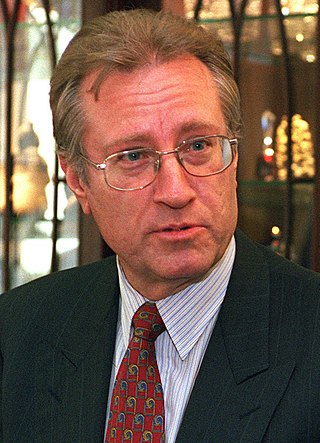
John Sewell is a Canadian politician and lawyer who served as the 58th mayor of Toronto from 1978 to 1980.

Toronto City Council is the governing body of the municipal government of Toronto, Ontario. Meeting at Toronto City Hall, it comprises 25 city councillors and the mayor of Toronto. The current term began on November 15, 2022.

The Chairman of the Municipality of Metropolitan Toronto or Metro Chairman was the regional chair of Metropolitan Toronto, Ontario, Canada, and the most senior political figure in the municipality. The Metro Chairman was elected by the members of Metropolitan Toronto Council.
The Metro New Democratic Party was a political party in Metropolitan Toronto, Ontario, Canada. It supported candidates for election to the municipal councils and school boards of the six municipalities that made up Metro Toronto. The party was organized by supporters of the social democratic New Democratic Party of Canada, and its provincial wing, the Ontario New Democratic Party (NDP).
The Toronto municipal election of 1978, held on Monday, November 13, 1978, was the first seriously contested mayoralty race in Toronto, Ontario, Canada, since David Crombie took office in the 1972 election. Crombie left municipal politics earlier in 1978 to seek and win a seat in the House of Commons of Canada as the Progressive Conservative Member of Parliament for Rosedale electoral district.

The 1985 Toronto municipal election was held to elect members of municipal councils, school boards, and hydro commissions in the six municipalities that made up Metropolitan Toronto, Ontario, Canada. The election was held on November 12, 1985.
Karl Jaffary is a Canadian former municipal politician in Toronto, Ontario.
The Toronto municipal election of 1976 was held on December 6, 1976 in Metropolitan Toronto, Ontario, Canada. Mayors, city councillors and school board trustees were elected in the municipalities of Toronto, York, East York, North York, Etobicoke and Scarborough.
Michael Foster is a former municipal politician in Toronto, Ontario, Canada. He was an alderman in the Metro Toronto municipality of North York from 1978 to 1985, and later campaigned for Mayor of North York in 1988. He has also sought election to the Legislative Assembly of Ontario. Foster is a member of the New Democratic Party (NDP).

The 1982 Toronto municipal election was held on November 8, 1982, in Metropolitan Toronto, Ontario, Canada. Mayors, controllers, city councillors and school board trustees were elected in the municipalities of Toronto, York, East York, North York, Etobicoke and Scarborough.
The 1980 Toronto municipal election was held on November 10, 1980 in Metropolitan Toronto, Ontario, Canada. Mayors, controllers, city councillors and school board trustees were elected in the municipalities of Toronto, York, East York, North York, Etobicoke and Scarborough.
The 1974 Toronto municipal election was held on December 2, 1974 in Metropolitan Toronto, Ontario, Canada. Mayors, controllers, city councillors and school board trustees were elected in the municipalities of Toronto, York, East York, North York, Etobicoke and Scarborough.
Margaret Campbell was a politician in Ontario, Canada. She was a Liberal member of the Legislative Assembly of Ontario, representing the downtown Toronto riding of St. George. Prior to her provincial role, she served as a municipal councillor in Toronto from 1958 to 1962 and later as a member of the Board of Control from 1964 to 1969. She ran for mayor of Toronto in 1969 but came in second to William Dennison.
The 1972 Toronto municipal election was held December 4, 1972, to elect the governments of Toronto, Ontario, Canada, the five other boroughs, and the government of Metro Toronto as well.
Municipal elections were held in Toronto, Ontario, Canada, on December 5, 1966. The elections were the first in Toronto after its merger with several smaller suburban communities on January 1, 1967. Forest Hill and Swansea were annexed by the City of Toronto, Leaside was merged with the Township of East York to become the Borough of East York. Weston was combined with the Township of York to form the Borough of York. The Village of Long Branch and the towns of Mimico and New Toronto were merged with the Township of Etobicoke to form the Borough of Etobicoke.
Municipal elections were held in Toronto, Ontario, Canada, on December 3, 1962. Incumbent mayor Nathan Phillips, then the longest-serving mayor in Toronto history, lost to Controller Donald Summerville by a significant margin.
Municipal elections were held in Toronto, Ontario, Canada, on December 5, 1960. Six-year incumbent mayor Nathan Phillips was challenged by former mayor Allan Lamport and Controller Jean Newman. Phillips was returned to office.
Municipal elections were held in Toronto, Ontario, Canada, on December 1, 1958. Four year incumbent mayor Nathan Phillips won reelection against Controller Ford Brand, who was supported by the Co-operative Commonwealth Federation and Toronto Labour Council, and Controller Joseph Cornish.
Municipal elections were held in Toronto, Ontario, Canada, on December 6, 1954. Incumbent mayor Leslie Saunders was defeated by Nathan Phillips in a close contest.
Dale Martin is a former Canadian politician, who served on Toronto City Council from 1984 to 1988 and Metro Toronto Council from 1988 to 1991.






